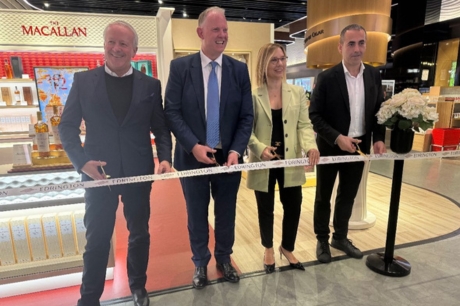Brexit bloodbath – but hope for inbound tourism
By Kevin Rozario |
UPDATED: The UK decision by a national referendum to leave the European Union (Brexit) has sent shock waves throughout the political establishments in both Great Britain and Europe – with instant reaction from financial markets. One beneficiary, however, could be inbound tourism.
The UK currency, pound sterling, has plunged against key currencies such as the US dollar and euro, while more than £200bn or $294bn [rate at the time of writing] was wiped off the London Stock Exchange this morning when it first opened. However, stocks have recovered since then (see chart above and click to enlarge).
The pound’s fall, if there is no later rally, could become the currency’s biggest ever one-day fall – the Black Friday that magnate George Soros warned of earlier this week. The decline has been reported as being of the magnitude of those seen in 2008 when the Lehman Brothers collapse triggered the global financial crisis, and when Britain exited the European exchange rate mechanism in 1992.

Carney: ‘Inevitably, there will be a period of uncertainty and adjustment following this result. There will be no initial change in the way our people can travel, in the way our goods can move or the way our services can be sold.’
BANK OF ENGLAND ASSURANCES
Mark Carney, the Governor of the Bank of England, gave a reassuring speech this morning to calm investor nerves, noting in particular that the capital requirements of the UK’s largest banks are now 10 times higher than before the global financial crisis [they have more than £600bn of high quality liquid assets] and stress tested “against scenarios more severe than the country currently faces”.
This seems to have stopped this morning’s LSE share rout – while the pound’s continued fall is a typical flight to safety, to currencies such as the dollar and euro, when stability is threatened.
Carney said: “Inevitably, there will be a period of uncertainty and adjustment following this result. There will be no initial change in the way our people can travel, in the way our goods can move or the way our services can be sold. And it will take some time for the United Kingdom to establish new relationships with Europe and the rest of the world.
“The Treasury and the Bank of England have engaged in extensive contingency planning and the Chancellor and I have been in close contact, including through the night and this morning. The Bank will not hesitate to take additional measures as required as those markets adjust and the UK economy moves forward.”
Only the UK itself can start its exit process from the European Union, and the ensuing complex negotiations, by invoking Article 50 of the Lisbon Treaty, and notifying the European Council. There are two meetings coming up when that council meets – in October and December – but with UK Prime Minister David Cameron stepping down in three months – and a general election also mooted – it may be later rather than earlier that the process will be started.
DUTY FREE IMPLICATIONS: BEFORE 2018 AND AFTER
 From a DF&TR perspective, the European Travel Retail Confederation issued a statement this morning pledging “to secure the best possible outcome for the businesses it represents and to seek clarity as early as possible”.
From a DF&TR perspective, the European Travel Retail Confederation issued a statement this morning pledging “to secure the best possible outcome for the businesses it represents and to seek clarity as early as possible”.
The Duty Free World Council, the global voice for the industry, added: “The decision presents the duty free and travel retail sector, both in the UK and in Europe, with a unique set of challenges. DFWC will support the industry in navigating these uncharted waters.”
There are two scenarios to look at for travel, aviation and DF&TR players: the transition period until the end of 2018, and the post-exit landscape afterwards.
The falling pound makes travel and tourism conditions much more favourable for inbound travel to the UK. This could also reignite falling spends from the Chinese in the UK versus its European counterparts, in both domestic and travel retail environments – a boon for luxury brands.
On the other side, outbound travel – and DF&TR spends especially places where Brits are crucial like Spain – could take a big hit given the typically value-conscious nature of UK consumers. At travel retail analyst, CiR, Founder, Garry Stasiulevicuis, tells TRBusiness: “The travel sector finds itself in a unique and unenviable position of uncertainty in regards to the UK market. The potential stagnation, or decrease in the number of UK travellers presents a real risk to duty free store footfall and associated retail opportunities.”

Stasiulevicuis: ‘The potential stagnation, or decrease in the number of UK travellers presents a real risk to duty free store footfall and associated retail opportunities.’
The British are the second largest international traveller group in the world with over 85m departing passengers in the 12 months to March 2016 (source: CiR – see new British Nationality 2016 report for details) and growing at just under +8% year-on-year.
“Almost 60% of UK nationals travelling internationally from the UK are flying to destinations within the EU, so changes to the UK’s role within the EU have the potential to change the travel dynamic of the nation,” states Stasiulevicuis. Understanding British shopping preferences and retail behaviour of this key group will therefore be critical to EU markets that rely on them.
According to the analyst’s Business Lounge statistics, Spain, Germany and Italy are the key EU destinations for UK travellers, with other EU nations such as France, Ireland and the Netherlands all appearing in the top 10. Residents of these countries are, likewise, the biggest EU visitors to the UK.
AND AFTER 2018?
After the two-year exit period, an unknown quantity lies ahead for the DF&TR industry. The UK’s possible withdrawal or sidelining from EU agreements that range from caps on mobile data roaming charges, air compensation, even visa restrictions for consumers, to the single skies policy for aviation, are key issues to deal with.

Jankovec: ‘While there is for now much uncertainty as to what will be the model, structure and modus operandi for this new relationship, it will be essential that it allows for the UK and EU aviation markets to remain fully integrated and based on totally aligned – if not common – rules.’
Airport trade body, ACI Europe, has just released a statement urging that EU and UK aviation markets remain fully integrated in the future – “to safeguard and promote vital air connectivity for consumers as well as continued economic development”.
Olivier Jankovec, Director General of ACI Europe says: “The EU and the UK are faced with the challenge of establishing a new relationship. While there is for now much uncertainty as to what will be the model, structure and modus operandi for this new relationship, it will be essential that it allows for the UK and EU aviation markets to remain fully integrated and based on totally aligned – if not common – rules.
“The EU’s single and fully liberalised aviation market has delivered tremendous benefits for consumers and businesses across Europe – with increased air connectivity at lower fares at its core. We simply cannot afford to go backwards on what is now one of the backbones of our economies.”
 Euromonitor has painted a rather bleak picture of inbound travel to the UK post-Brexit for the period 2015 to 2020. Before the referendum, the analyst said there would be a potential fall in demand of over 2.3m visitors, amounting to a decline of over -5% of total arrivals, based on GDP declines in source markets.
Euromonitor has painted a rather bleak picture of inbound travel to the UK post-Brexit for the period 2015 to 2020. Before the referendum, the analyst said there would be a potential fall in demand of over 2.3m visitors, amounting to a decline of over -5% of total arrivals, based on GDP declines in source markets.
Caroline Bremner, Head of Travel at Euromonitor International, said: “Destination branding and consumer desire to travel would be hit hard by the uncertainty Brexit would entail in the short to mid-term.” Since the vote the analyst has revised down the impact (see table right for its latest figures and click to enlarge).
One plus for the UK is the potential resurrection of actual duty free sales (ie without excise taxes) that UK travellers used to enjoy to EU destinations, the re-emergence of the ‘booze cruise’ across the English Channel, and duty free sales on ferry services on the Irish Sea to Ireland, but such scenarios are purely speculative at this stage.
TR Consumer Forum: Agenda & speakers revealed
Influential speakers will unpack the most effective strategies for understanding and engaging...
OUT NOW: March/April Leading Americas Operators
The TRBusiness March/April 2024 edition boasting the inimitable leading Americas Operators...
Saudia Arabia's KKIA unfurls T3 duty free expansion
King Khalid International Airport (KKIA) has unveiled the first stage of its much-vaunted duty...

In the Magazine
TRBusiness Magazine is free to access. Read the latest issue now.

 Trbusiness. The travel retail Trbusiness. The magazine for global retail and duty free professionals.
Trbusiness. The travel retail Trbusiness. The magazine for global retail and duty free professionals.























